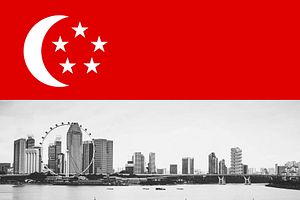Singapore Prime Minister Lee Hsien Loong called Tuesday for early general elections despite the coronavirus, saying the outbreak has stabilized and there is no assurance it will be over by next April, when the current government’s term ends.
Parliament was dissolved to pave the way for the polls, which the Elections Department said would be held on July 10.
The announcement came just four days after the city-state lifted most COVID-19 restrictions, and appeared to be an attempt to take advantage of a quiet window before a possible worsening of the pandemic’s impact.
Lee said the country must prepare for ups and downs, noting there has been a resurgence in cases in some countries that have reopened. He also said Singapore hasn’t felt the full brunt of the economic fallout yet, so there will be more business closures and higher unemployment.
“A long struggle lies ahead,” he said in a televised speech. “An election now when things are relatively stable will clear the decks and give the new government a fresh full five-year mandate. It can then focus on this national agenda and the difficult decisions it will have to make and to carry.”
Singapore was initially hailed as a model for containing the virus, but cases in the country of only 5.8 million people then soared to more than 42,000, one of the highest infection rates in Asia, with most linked to dormitories used to house foreign migrant workers. Lee said infections in the dorms have declined, while cases outside the dorms have stabilized.
He said he decided to hold elections now because there is “no assurance” the pandemic will end by next April. Despite a ban on rallies, he said political parties can still campaign effectively and voters can cast ballots safely, citing examples in recent elections held in South Korea, Taiwan, and several European countries.
Lee said more polling stations will be set up, voters will be allocated time slots to cast their ballots to prevent crowds, senior citizens will be given priority, and safe distancing rules will be observed.
Nur Azlinda, a 38-year-old telecommunications worker, said she is worried about having an election during the pandemic.
“Of course we have to do our parts as Singaporeans, but the negative part is that because of COVID, we are not supposed to be gathering, and I’m afraid that there will be another wave of COVID,” she said.
Lee’s People’s Action Party, in power since 1959, is widely expected to keep its overwhelming majority in Parliament, where it currently holds 83 out of the 89 seats. The test will be whether it can retain the 69.9 percent share of the vote it received in 2015. The election is also pivotal for Lee, 68, who plans to retire and hand over power to a new crop of leaders.
“This general election will be like no other that we have experienced. Not just because of the special arrangements to deal with COVID-19, but because of the gravity of the situation, and the issues at stake,” Lee said. He urged voters to “vote wisely to secure our lives, our jobs, and our future.”
By Royston Chan for The Associated Press. Associated Press writer Eileen Ng in Kuala Lumpur, Malaysia, contributed to this report.

































